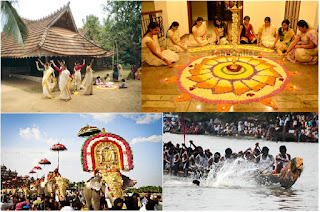The peninsular Indians have passed
their customs and beliefs generations after generations. South Indian culture
is the celebration of motherhood.
With any culture wedding is the most
crucial ceremony. And in south India it is the biggest carnival in the family.
South Indian wedding is all about jewellery, feast, silk saris, decorations,
melam (a kind of drum music) and of course gossips and is strictly an arranged
marriage. The bride and the groom are highlighted in the celebration on their
traditional sari and dhoti.
The costumes of the South Indians are alike and so are their moralities. But they do differ in following aspects.
TRADITION
|
KERALA
|
TAMIL NADU
|
KARNATAKA
|
ANDHRA PRADESH &
TELANGANA
|
Language
|
Malayalam
|
Tamil
|
Kannada
|
Telugu
|
Traditional dance
|
Kathakali
|
Bharatanatyam
|
Yakshagana
|
Kuchipudi
|
Festivals
|
Onam
|
Pongal
|
Dasara
|
Ugadi, Sankranti
|
In Kerala, none of the festivals are complete without elephants. Most of the hindu temples own elephants. The world famous Guruvayur temple has more than 60 elephants. And the festival of Pooram in Thrissur is known for the mighteous walk of more than 150 elephants decorated with flowers and umbrellas.
Flowers are the ornamental accessories of the peninsular mother. They are omnipresent with the tradition. One such festival of flowers is Onam.
Onam
Onam is one of the most popular festivals of the God’s country, Kerala. The richness of the Cultural heritage can be seen during the 10 day festival. It is celebrated to welcome king Mahabali, under whose reign Kerala received all its natural wealth. The malayalis welcome the king by decorating their houses and by making rangoli with flowers. The women of the houses perform the traditional dances Kaikotti Kali (by clapping their hands) around the rangoli.
Festivals are always accompanied with music and dance. Carnatic music is more than 1000 years old and
was born in South India. It is dedicated to god and is all about the human soul speaking with the eternal spirit.
“Dance is the hidden language of the soul” in South India
And dancers of south India dream with their foot. Kathakali realises the dreams of all dances. The performer has to completely get synched with the character to make the show a success. He/She get dressed up according to the character. And the characters are categorised with different colours in the makeup to enhance the eye expressions.
South Indian food traditionally is made of rice. Dining in Kerala is a real treat for the sea food lovers. Food in Kerala is coconut based. Traditionally, food is served in banana leaf and is eaten with hands.
Story telling is an ancient tradition of south India and it still prevails. In Kerala, the story telling branches out as Harikatha, Pathakam, and Kathaprasangam.
Patakam - Belonged to the Nambiar community of Kerala. It has no instruments. Slokas are recited and the meanings are explained.
Harikatha - is rich in music. The narrator sings the story of Lord Vishnu with instrumental music.
Kathaprasangam - is much similar to Harikatha, the difference is that random stories is narrated. The story may be about an old king and his achievements or about the scene of Kerala.
Mall Yudham is a dying traditional martial art of South India. We feel honoured to present such an article to keep our traditions alive and praise our mother land!
Author: Subhashini Rajendran, a freelance writer. She writes at
http://www.durofy.com/author/









No comments:
Post a Comment